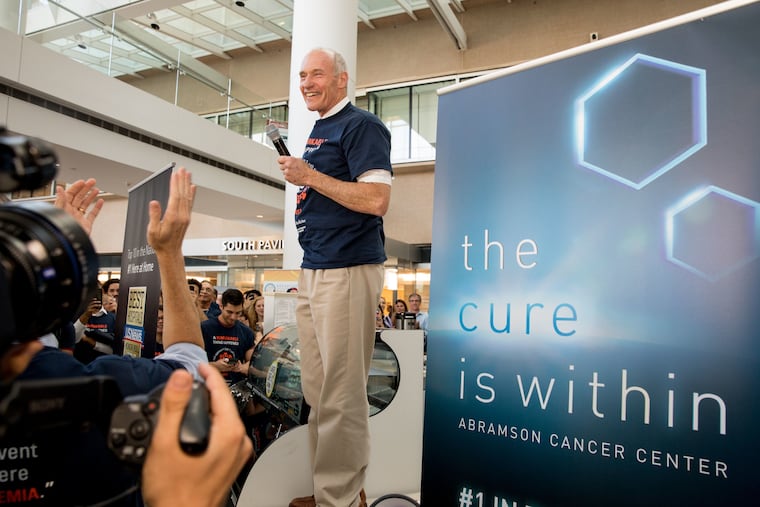Penn immunotherapy pioneer Carl June shares prize from Israeli foundation that also honors Fauci
The work led to Kymriah, the first personalized cellular therapy for cancer, which treats adult and pediatric blood cancers such as leukemia.

In the 1980s, Israeli immunologist Zelig Eshhar took a giant step toward finding the Holy Grail of cancer treatment: a way to make the immune system attack when its own bodily tissue turns malignant. But it wasn’t until almost two decades later that his American colleagues, Carl June and Steven A. Rosenberg, figured out how to make that attack so potent that it would eradicate advanced, recurrent blood cancers.
On Monday, the three pioneers of “chimeric antigen receptor T-cell therapy” — CAR T cells — shared a $1 million prize awarded by the Dan David Foundation, headquartered at Tel Aviv University. It annually bestows awards in three categories — past, present and future — to honor “outstanding contributions that expand knowledge of the past, enrich society in the present, and promise to improve the future of the world.”
June, 68, Rosenberg, 80, and Eshhar, 80, won in the future category.
June led the groundbreaking work at the University of Pennsylvania and Children’s Hospital of Philadelphia that culminated in the FDA approval in August 2017 of Kymriah, the first personalized cellular therapy for cancer. It treats adult and pediatric blood cancers such as leukemia.
Rosenberg, chief of surgery at the National Cancer Institute’s Center for Cancer Research, took the field even further by identifying an elite subset of immune cells, called “tumor-infiltrating lymphocytes,” that could wipe out solid tumor cancers. Iovance Biotherapeutics licensed Rosenberg’s TIL technology and is now working to manufacture and clinically test the first TIL therapy, a metastatic melanoma treatment called lifileucel, at its new facility at the Navy Yard in South Philadelphia.
“I am honored and humbled to receive the Dan David Prize,” said June, who is also director of the Parker Institute for Cancer Immunotherapy at Penn. “This is especially meaningful to me to be given the award along with Steven Rosenberg and Zelig Eshhar, who have been my long-term mentors and colleagues over the past 30 years.”
Eshhar, an immunologist at the Weizmann Institute in Israel, was the first to prove that an audacious idea could work. He removed a cancer patient’s T cells, the rugged soldiers of the immune system, and genetically engineered them to carry and execute instructions for destroying the cancer. These terminator cells were called “chimeric” after the Chimera, the Greek mythological fire-breathing monster composed of parts of a lion, a serpent, and a goat.
Although the T cells worked in lab experiments, the results were disappointing when tested years later in patients with ovarian, kidney and other cancers. By then, many labs, including June’s, were pursuing Eshhar’s approach.
June said that he and Eshhar bonded over professional and personal meetings. “It’s the perfect example of how some basic idea in science that doesn’t yet have a practical application should be fostered.”
As it turned out, CAR T-cells need two genetic signals to become fully activated. June’s lab discovered that a relatively obscure secondary booster signal, called 4-1BB, could turbocharge the engineered T cells.
This year’s Dan David prize in the “present” category went to Anthony Fauci, National Institutes of Health infectious disease expert, for his role in battling the current coronavirus pandemic, including supporting the development of the novel mRNA vaccines for COVID-19.